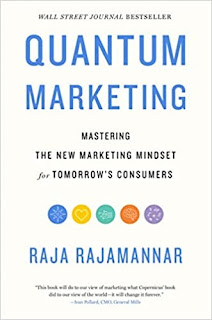 |
| Source: Amazon |
A quick scan of the first several pages of search results revealed that many of the articles and other materials focused on a specific aspect of marketing or a particular marketing technique. It's more difficult to find content that takes a longer-term, big-picture view of the future of marketing. A new book by Raja Rajamannar, the Chief Marketing and Communications Officer at MasterCard, fills the gap.
In Quantum Marketing: Mastering the New Marketing Mindset for Tomorrow's Consumers (HarperCollins Leadership, 2021) , Rajamannar lays out his vision for how marketing needs to evolve in the face of a deluge of emerging technologies that will change how people obtain information, communicate and live their daily lives.
Technological developments have already driven huge changes in how marketing is practiced, but Rajamannar argues that the changes we have seen so far amount to only the tip of a massive iceberg. He writes, "The last five years have seen more change in marketing than the previous fifty. And the next five years will outpace all of them put together."
Rajamannar contends that we are standing at the precipice of the fifth paradigm of marketing, which he calls "Quantum Marketing." In this impending new era, the marketing function will have the potential to ". . . leapfrog toward astonishing levels of consumer insights, real-time interactions, and hyper-targeted, hyper-relevant consumer engagement."
But Rajamannar also argues that marketing needs a fundamental reset to take full advantage of the opportunities the era of Quantum Marketing will offer.
He notes that marketing is currently in a crisis, with a growing number of companies " . . . fragmenting the 4 Ps of marketing . . . and distributing them across multiple areas outside of marketing." He also refers to research showing that most CEOs say they have little confidence in their marketing team, and he suggests that many CEOs don't see value in marketing.
The Landscape of Quantum Marketing
Rajamannar devotes most of the book to a description of his vision of what marketing can look like in the era of Quantum Marketing. He addresses a wide range of topics, including:
- The continuing - and explosive - proliferation of customer data (Chapter 4)
- Advances in the capabilities of artificial intelligence and the rapid growth of marketing-related AI use cases (Chapter 5)
- The emergence of a slew of new technologies that will enable new ways to connect with customers (Chapter 6)
- The impact of blockchains on the marketing/advertising ecosystem (Chapter 7)
- The need for a new approach to customer loyalty (Chapter 10)
- The declining impact of traditional advertising (Chapter 11)




No comments:
Post a Comment